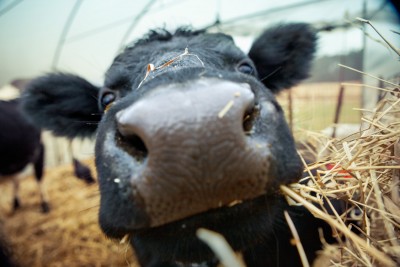Ration Balancing for Beef Cattle
Amy Barkley, Team Leader & Livestock Specialist
Southwest New York Dairy, Livestock and Field Crops Program

Beef nutrition is more than just providing the cattle with feedstuffs. While beef animals can do well, even thrive, on diets that are as simple as baled forage and/or pasture and mineral supplements, feeding in a precise manner can help improve rates of gain, body condition, finishing quality, and result in an animal that is more ideally suited for market. Feeding this way may also offer an added benefit of cost savings, since balanced rations allow a producer to feed to the animals' needs, rather than potentially over or under providing different nutrients. Balanced rations are diverse, tailored to each operation, and can be as simple as forage and quality mineral supplement, or more complex with the addition of concentrates such as corn or soybeans.
Prior to building any beef ration, knowing the quality of the dietary components you have available is important. First, assess that the components are free of any molds, rots, or unwanted inclusions (such as metal in baled forage or toxic weeds in a pasture). The next step is to have the feed components tested for their nutritional composition. Because forage is a large part of many producers' diets, and if testing only one component is realistic, forage should be the priority. Forage is highly variable in its nutrient composition, since it can be easily impacted by factors including plant species, plant age, weather, and harvest technique. Taking samples of baled forage or pasture and sending them to a reputable lab for nutritional testing will provide you with information needed to balance your ration, including values of TDN (total digestible nutrients) and CP (crude protein).
Rations for beef cattle will differ based on factors including breed, age, sex, herd composition, and time of year. Nutritional requirements for each age and stage have been compiled in the publication, "Nutrient Requirements of Beef Cattle", which is updated regularly and published by the National Research Council (NRC). These numbers provide the basis for many of the recommendations given by beef nutritionists and research scientists.
Balancing rations can be done through a nutritionist, or can be done on your own. Two free online tools, developed by Oklahoma State University, can aid in the balancing of diets using Excel spreadsheets. Both can be found through this link: http://beefextension.okstate.edu/pages/calculators. The "OSU COWCULATOR" manages the dietary needs of cattle in maintenance (adults). This program is based on research data as well as NRC requirements. The second tool, "OSU Ration Calculator 2013", can also be used to balance a ration to NRC requirements, while allowing slightly more flexibility than the first tool. For either of these spreadsheets, knowing the actual intake of the cattle you are formulating for will allow for the most accurate formulation, since nutrient values for a diet are partially based on intake. It should be noted that the "OSU COWCULATOR" only allows feed to be entered on an as-fed basis, while the "OSU Ration Calculator 2013" allows for feed to be entered on both an as-fed or dry matter basis.
If you need aid in testing your feed components or using the tools above to balance rations, contact your local extension agent!
Upcoming Events
Boots in the Barn: Cornell Dairy Research Updates
January 13, 2026
January 20, 2026
January 27, 2026
February 3, 2026
February 10, 2026
February 17, 2026
February 24, 2026
Join us for some or all!
Deerworm and Flukes in Small Ruminants Webinar
February 25, 2026 : Deerworm and Flukes in Small Ruminants Webinar
Dr. Mary Smith from Cornell's College of Veterinary Medicine and Dr. Rachel White from UMaine Cooperative Extension will be discussing the lifecycles, signs, prevention, and management of deerworm and liver flukes in small ruminants.
NYSDEC How to Get Certified Course
March 3, 2026 : NYSDEC How to Get Certified Course
Ellicottville, NY
NYSDEC training course in preparation to take the pesticide applicator exam.
Announcements
Cows, Crops & Critters Newsletter Sponsorship
TRYING TO REACH GROWERS AND AGRIBUSINESSES IN OUR SOUTHWEST REGION OF NEW YORK?Weekly Email Update: Shared with 625+ households who have signed up with our program.
Monthly Paper Mailer: To reach our stakeholders and farmers who lack internet access, we send out a monthly mailer where your company's logo and contact information would be featured with a mailing list of 330+ households.
If you sponsor our weekly and monthly publications you reach approximately 955 households.





